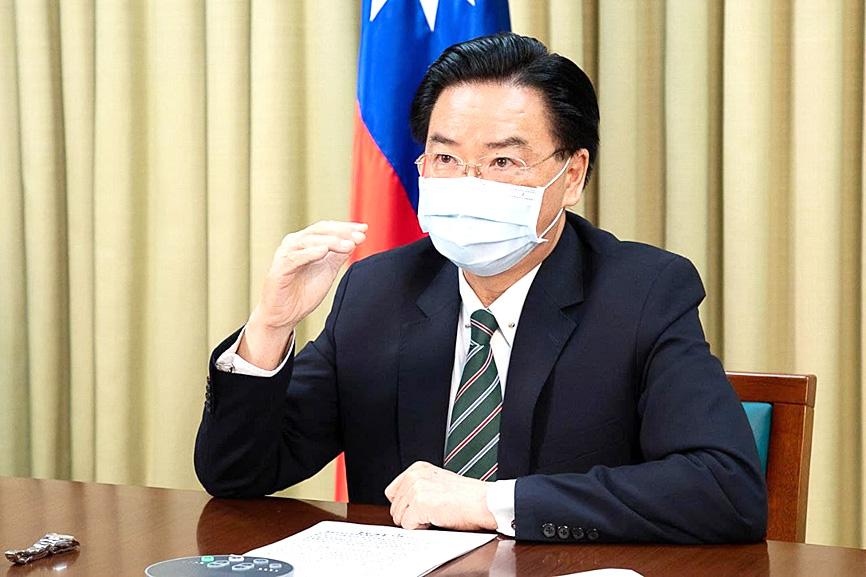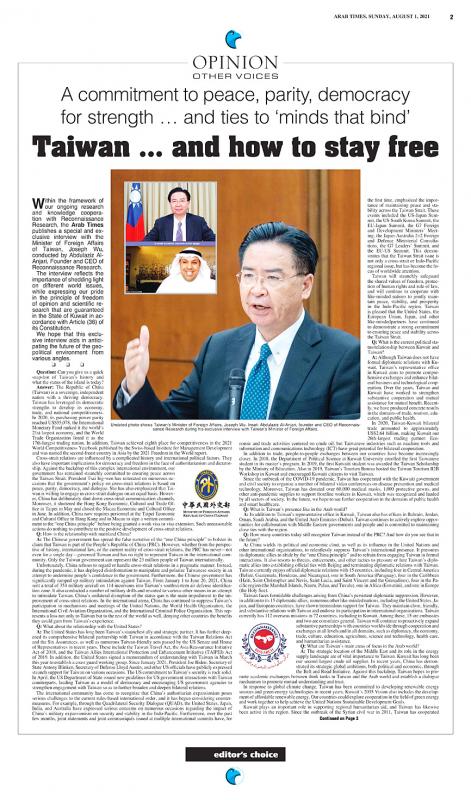The Ministry of Foreign Affairs yesterday condemned China for bullying the Kuwait-based English-language Arab Times into deleting from its Web site an already published interview with Minister of Foreign Affairs Joseph Wu (吳釗燮).
The Arab Times features diversified perspectives and is influential among the decisionmaking elite in Arab nations, the ministry said in a statement on Monday that touted the interview.
Wu was interviewed by Abdulaziz Mohammed al-Anjeri, cofounder and chief executive of Kuwaiti think tank Reconnaissance Research via videoconference on Wednesday last week, with the article published on Sunday, it said.

Photo courtesy of the Ministry of Foreign Affairs
In the interview, Wu talked about the threat China poses to the Indo-Pacific region, the progress of Taiwan-US relations, as well as opportunities for Taiwan to expand ties with Middle East nations, the ministry said.
However, the newspaper was found to have deleted the interview yesterday and published a statement from the Chinese embassy in Kuwait.
Describing Wu as a “stubborn ‘Taiwan independence’ separatist,” the embassy condemned “the despicable acts of Taiwan independence separatists to deliberately distort the history of Taiwan, viciously attack the Chinese government and mislead public opinion.”

Photo courtesy of the Ministry of Foreign Affairs
“There is only one China in the world and Taiwan is an inalienable part of China’s territory. This is a basic fact universally recognized by the international community,” the embassy’s statement said.
“Over the years, the Chinese government has rolled out multiple measures and policies to maintain peace and stability across the Taiwan Strait, and safeguard the well-being of people across the Taiwan Strait,” it said.
The embassy demanded that Kuwaiti media “stay alert to attempts of the ‘Taiwan independence’ forces and refuse to do anything that hurts the feelings of 1.4 billion Chinese people or the friendship between China and Kuwait.”
It is extremely regrettable that the Arab Times decided to delete the interview, ministry spokeswoman Joanne Ou (歐江安) said yesterday.
The ministry condemns the Chinese government for its meddling with another nation’s freedom of the press and its attempts to silence Taiwan, she said.
The Chinese Communist Party regime demonstrates its barbaric nature when it attempts to force other sovereign nations into accepting its unilateral positions based on its fictional “one China” principle, she added.
Taiwan is Taiwan, and it has never been under the jurisdiction of the Chinese government, Ou said.
The Taiwanese government and its people would continue to defend democracy, the rule of law, freedom of the press and free speech, she said, calling on the international community to resist China’s bullying with courage and determination.

CHAOS: Iranians took to the streets playing celebratory music after reports of Khamenei’s death on Saturday, while mourners also gathered in Tehran yesterday Iranian Supreme Leader Ayatollah Ali Khamenei was killed in a major attack on Iran launched by Israel and the US, throwing the future of the Islamic republic into doubt and raising the risk of regional instability. Iranian state television and the state-run IRNA news agency announced the 86-year-old’s death early yesterday. US President Donald Trump said it gave Iranians their “greatest chance” to “take back” their country. The announcements came after a joint US and Israeli aerial bombardment that targeted Iranian military and governmental sites. Trump said the “heavy and pinpoint bombing” would continue through the week or as long

TRUST: The KMT said it respected the US’ timing and considerations, and hoped it would continue to honor its commitments to helping Taiwan bolster its defenses and deterrence US President Donald Trump is delaying a multibillion-dollar arms sale to Taiwan to ensure his visit to Beijing is successful, a New York Times report said. The weapons sales package has stalled in the US Department of State, the report said, citing US officials it did not identify. The White House has told agencies not to push forward ahead of Trump’s meeting with Chinese President Xi Jinping (習近平), it said. The two last month held a phone call to discuss trade and geopolitical flashpoints ahead of the summit. Xi raised the Taiwan issue and urged the US to handle arms sales to

State-run CPC Corp, Taiwan (CPC, 台灣中油) yesterday said that it had confirmed on Saturday night with its liquefied natural gas (LNG) and crude oil suppliers that shipments are proceeding as scheduled and that domestic supplies remain unaffected. The CPC yesterday announced the gasoline and diesel prices will rise by NT$0.2 and NT$0.4 per liter, respectively, starting Monday, citing Middle East tensions and blizzards in the eastern United States. CPC also iterated it has been reducing the proportion of crude oil imports from the Middle East and diversifying its supply sources in the past few years in response to geopolitical risks, expanding

Pro-democracy media tycoon Jimmy Lai’s (黎智英) fraud conviction and prison sentence were yesterday overturned by a Hong Kong court, in a surprise legal decision that comes soon after Lai was jailed for 20 years on a separate national security charge. Judges Jeremy Poon (潘兆初), Anthea Pang (彭寶琴) and Derek Pang (彭偉昌) said in the judgement that they allowed the appeal from Lai, and another defendant in the case, to proceed, as a lower court judge had “erred.” “The Court of Appeal gave them leave to appeal against their conviction, allowed their appeals, quashed the convictions and set aside the sentences,” the judges